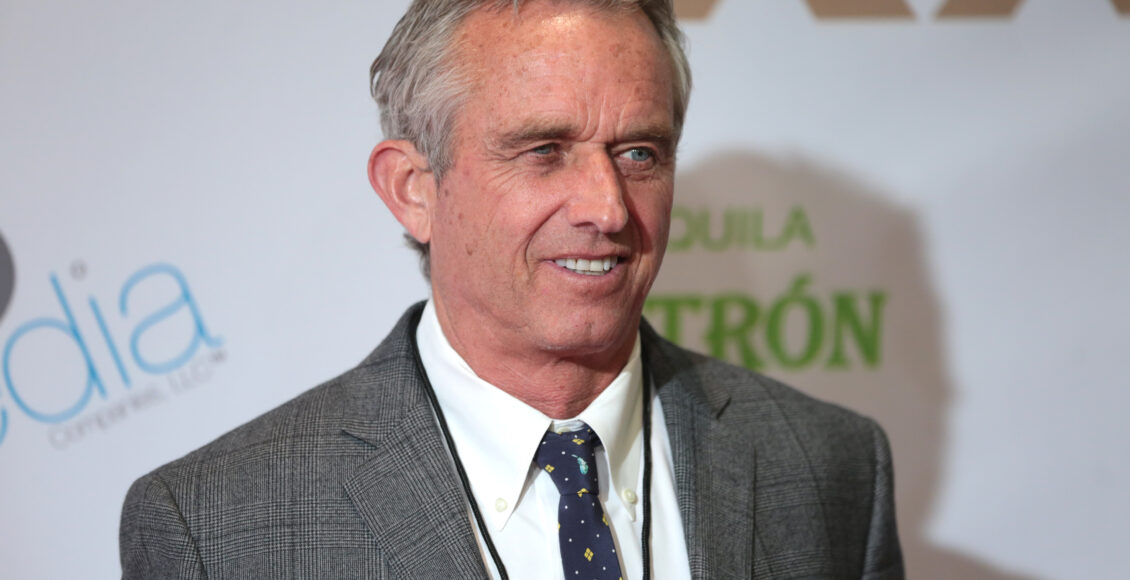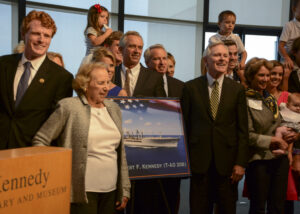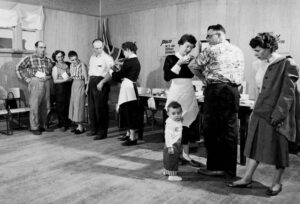The RFK Jr. School of Science

Robert F. Kennedy Jr. is making waves as a candidate for the Democratic nomination in the United States 2024 Presidential Election. Kennedy is widely known for his anti-vaccine “activism” and his role as the founder of the Children’s Health Defense, a non-profit group campaigning against the safety and efficacy of vaccines. As a fourth-year microbiology undergrad, I feel confident in the assessment that his claims disregard the most introductory virology course. His rambling tirades resemble me after a long day at the lab trying to explain a biochemical pathway to my lab supervisor. The prominence of his and his foundation’s disinformation and conspiracy theories speaks to a rising trend of distrust in science and research institutions. Given the attention on everything RFK Jr., from mainstream and non-traditional media alike, I can’t help but be alarmed by the failing relationship between science and the public.
Kennedy, the son of former US Attorney General Robert F. Kennedy and nephew of the 35th President of the United States John F. Kennedy, is polling around 20 per cent among Democratic voters, largely due to the political dynasty associated with his last name. His political positions are distinct relative to those of mainstream Democrats. Kennedy is opposed to the Biden administration’s approach to the war in Ukraine; he was recently on Joe Rogan’s podcast, where, in addition to bashing childhood vaccines, he discussed the idea of 5G networks damaging human DNA and conspiracies about the emergence of HIV/AIDS and therapies.
Claims against childhood vaccines
Kennedy has a longstanding history of anti-vaccine rhetoric. In 2005, he authored the since-removed article “Deadly Immunity,” published in Rolling Stone and Salon. The claims made in this article, which primarily center around linking childhood vaccines and autism, have since been repeatedly debunked by scientists, citing “severe research misconduct” and conflict of interest. Such anti-vaccine findings had been previously published by Andrew Wakefield, a British physician, in the 1990s, with severe consequences. Co-authors on the studies withdrew their support and Wakefield has since been removed from the UK General Medical Register’s list of accredited doctors. Nevertheless, in Kennedy’s op-ed, based on these findings, he urged “scientists and researchers … to come clean” regarding vaccine ingredients and the discredited role such ingredients play in the studies of childhood autism. In the years since, despite backlash on both ends of the political spectrum, he has remained vocal against vaccines and refused to acknowledge the studies and safety reviews of vaccines published by the CDC and other healthcare institutes.
Deadly repercussions
The anti-vaccine rhetoric platformed by Kennedy has had a severe impact both in the US and around the world. By spreading false information and misrepresenting claims in a seemingly scientific tone, he promotes rampant pseudoscience nationally and internationally. By citing doctors whose medical licenses have been suspended and whose research has long been debunked, Kennedy cherry-picks evidence from studies to promote false medical information and misinterpret findings, contributing to public health concerns. Most recently in July 2023, Kennedy claimed that “COVID-19 is targeted to attack Caucasians and Black people” while “the people who are most immune are Ashkenazi Jews and and Chinese.” The unfounded conspiracy of COVID-19 as a bioweapon against specific ethnicities is an extreme jump from the connected BMC Medicine study on DNA polymorphisms (variation in genetics between individuals or populations) and susceptibility for COVID-19. These anti-semitic and anti-Chinese claims peddled in response to the pandemic are deeply offensive, dangerous, and particularly shocking from a presidential candidate. In actuality, the study found that small genetic variances in the cell receptor for COVID-19 could be linked to ethnic differences, not that the severity of COVID-19 was influenced by these variances. Kennedy later took to Twitter to deny that he was suggesting COVID-19 to be “deliberately engineered.”
Apart from the political ramifications of Kennedy’s comments, his spreading of anti-vaccine misinformations has had deadly repercussions. For example, after an incident in the summer of 2018 in Samoa where two nurses improperly mixed vaccines with muscle relaxants, ultimately resulting in the death of two infants, his organization’s social media presence and advocacy efforts focused in on the country. Both nurses were convicted of manslaughter, but still, Kennedy’s Children’s Health Defense anti-vaccine advocacy group made statements on Facebook calling the safety of these vaccines into question and never revised social media posts once the cause of the incident was discovered. In 2018, Kennedy visited independence celebrations in the country and, in tandem with Taylor Winterstein, a fellow anti-vaccine activist from Australia and Samoa, wrote a public letter to the Samoan Prime Minister to investigate the Measles-Mumps-Rubella vaccine (MMR) vaccine. That year, MMR infant vaccination rates dropped to among the lowest in the world, from over 60 per cent to just 31 per cent. As a result, 2437 people in Somoa got sick with measles, and 32 died. Kennedy’s words go beyond fear-mongering science, costing lives, mostly of children.
This fearmongering about vaccines poses a striking contrast to the work done by RFK Jr.’s uncle, President John F. Kennedy. In 1962, as President, JFK signed the Vaccination Assistance Act and proclaimed the achievement as groundbreaking to eradicate polio, diphtheria, whooping cough, and tetanus in the US. Surviving Kennedys, such as his two siblings, Joseph Kennedy II and Kathleen Kennedy Townsend, and JFK’s grandson, John Schlossberg, have been quick to publicly disavow RFK Jr.’s claims as “tragically wrong.”

“The Kennedy family poses with SECNAV at the ship name unveiling.” by Official U.S. Navy Imagery is licensed under CC BY 2.0.
Skepticism towards science
Since the onset of the COVID-19 pandemic, scientific claims have increased on non-traditional media platforms, where fact-checking is limited or absent altogether. Media formats like social media and podcasts often attract different demographics from mainstream news media. For instance, in a 2020 MediaMonitors survey of Joe Rogan’s listenership, 77 per cent are men and the average age of listeners is no higher than 24. Anti-vaccine misinformation also propagates on platforms such as Facebook, Instagram, and Twitter. This recent platforming of anti-vaccine rhetoric coincides with a spike in the number of children dying of vaccine-preventable diseases like whooping cough, measles, and smallpox. In 2000, measles was declared eliminated by the World Health Organization 一 but 1215 cases in the US since 2019 have created new cause for alarm.

“Two public health nurses vaccinate adults at a polio clinic in Southey, Saskatchewan / Deux infirmières de la santé publique vaccinent des adultes dans une clinique de poliomyélite à Southey (Saskatchewan).” by BiblioArchives / LibraryArchives is licensed under CC BY 2.0.
Rising distrust in science is translating into personal threats and harm to scientists. A survey of 300 scientists by Nature, the leading academic journal in science, showed that since the COVID-19 pandemic 60 per cent of respondents suffered attacks on credibility, 22 per cent faced threats of physical or sexual violence, and 15 per cent had received death threats after speaking to the media or posting on the abovementioned alternative media platforms. In a digital age, coordinated efforts on social media greatly harm the willingness of scientists to speak to the media and engage with the public. Fears of ramifications and personal harm limits make it more difficult for scientists to help the public make informed decisions and address issues of public concern.
Restoring trust in science
Restoring the public trust in science is no easy task. Even among scientists, there is constant debate and disagreement directed to validating findings and improving research methods. For many scientists and medical experts on social media, the majority of their time is spent correcting misinformation. In “doing their own research,” those seeking to challenge these scientists are often quick to overstate or misinterpret research findings.
Sharing new information must focus beyond just the content of findings but rather on conveying how the scientific process works. You will not win a debate against RFK Jr. or convince a QAnon conspiracist their understanding of immunology is not accurate, but you can still engage the general public. Community engagement and science communication tailored to the general public is needed to better manage expectations and the overwhelming amount of information available. Science is a gradual process and often unsatisfying. Our understanding of the world around us changes as our tools improve and new knowledge is uncovered.
Featured image: “Robert F. Kennedy Jr.” by Gage Skidmore is licenced under CC BY-SA 2.0.
Edited by Lily Molesky.
